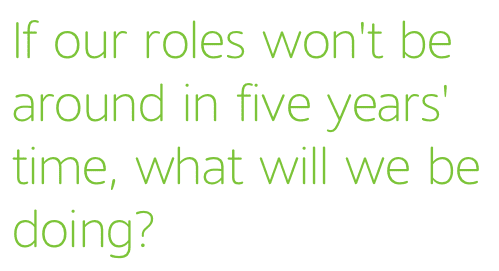More than a third of knowledge workers* (35%) in the US, UK and Germany believe the roles they do today will not exist in five year’s time, while 65% think that their roles will not look the same. This may be down to the rapidly changing work environment, on-demand economy or global digital transformation, but it is clear that the impact of change in the working world is being felt from the boardroom to the employee lounge. These findings are revealed in the Way We Work Study commissioned by Unify, the Atos brand for communications and collaboration software and services. This study surveyed 9,000 knowledge workers, those whose job is to “think for a living”, in the USA, UK and Germanyabout their current and future attitudes and expectations in their working lives.
The study also finds that “virtual” is the new reality for many teams. More than half of knowledge workers (52%) say that they now work in more virtual teams (distributed across offices and locations) than they have done in the past. They think this is a good thing, too. According to two-fifths of knowledge workers (42%), virtual teams can be more effective than face-to-face teams, and nearly half (49%) report that their organizations operate through technology and communication rather than through offices and locations. And over a third (36%) suggest that creative thinking is one of the biggest benefits of working with people outside of traditional, physically located teams. Virtual teams are also being enabled by cloud technology, with more than half of knowledge workers (57%) suggesting they use on-demand tools (e.g. internet/cloud based) for teamwork, project management or virtual collaboration.
“Today, knowledge workers have an unrivalled freedom in how they connect and engage with each other. This has been provided to them, by and large, through technology,” says Jon Pritchard, CEO at Unify. “The Way We Work Study shows the significant impact that technology, the trend of digital transformation and the on-demand economy is currently having on the workplace. It’s our belief that knowledge workers will increasingly want to define how, when and where they work. It’s up to businesses to enable this behavior and manage further disruption and change.”
While knowledge workers’ roles are in flux, the office as we know it is also going through rapid change. The study suggests that work is no longer just a place you go to – or want to go to. On average knowledge workers surveyed spend a fifth (20%) of their time outside the traditional office work environment, and as much as one-in-four (27%) want to spend 26-50% of their time this way. 69% also suggest that having a single office as a physical workplace is less important than it was in the past, Furthermore, almost three quarters (74%) of knowledge workers believe that digital technology, the internet and social media, has fundamentally changed the way they behave in the workplace. Of course, the office is not dead yet. Only 7% of knowledge workers say they would like to spend 75-100% of their time outside the traditional office environment — proving there’s still a place for the desk.
Today it appears we are dealing with a freelance and on-demand economy. One-in-five of all knowledge workers surveyed (21%) currently work as freelancers or contractors. And more than half (53%) say they would consider changing to a freelance or on-demand model of work over regular employment if it were offered.
Knowledge workers also have a clear idea of what they want from their ideal working environments. In their current roles, knowledge workers describe their businesses as successful (30%), collaborative (28%) and supportive (26%). This is quite far of their ideal though — respondents still want their workplace to be successful (51%), but also creative (50%), exciting (45%) and innovative (41%).
Knowledge workers are also taking more control of their time — both at work and at home. Work-life balance, it appears, is no longer an aspiration, with 95% of knowledge workers stating that they currently have a good balance between their work and personal lives and a further 50% say that their work-life balance has improved in the last five years.
“The Way We Work Study proves that there are some dramatic changes ahead in business where new ways of working are concerned. As knowledge workers continue to construct the future of work for themselves, employers must keep up. Technology will play a vital part in them realizing their ideals while ensuring that top talent remains engaged with their organizations,” continued Pritchard. “It is up to the global business community to recognize this and provide the tools that their knowledge workers most desire — those that will enable the creativity and innovation that the workforce is demanding.”
Help keep news FREE for our readers
Supporting your local community newspaper/online news outlet is crucial now more than ever. If you believe in independent journalism, then consider making a valuable contribution by making a one-time or monthly donation. We operate in rural areas where providing unbiased news can be challenging. Read More About Supporting The West Wales Chronicle
























